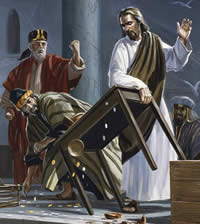What if Jesus isn’t flying off the handle while cleansing the temple? What if there’s something other than anger in his outburst?
You can always count on certain memes to make the rounds with the church crowds every few months. There’s the one about how Moses was technically the first person to download data from the cloud using a tablet (hilarious). Of course, you can’t forget the meme that encourages you to like and share a picture of Jesus, but it’s actually Obi-Wan Kenobi (cringeworthy when your sweet old aunt doesn’t get the joke).
Another favorite that regularly pops up on newsfeeds is an image of Jesus cleansing the temple, with the text:

This one seems to be a favorite for those who long to excuse their tempers and turn their bad attitudes into something holy. They see Jesus’ actions in this story as giving them permission to fly off the handle and offer someone a beat down—y’know, just like Jesus. But what if Jesus isn’t flying off the handle while flipping tables? What if there’s something other than anger in his outburst? And what if it’s something more deserving of our imitation?
Here’s the part where I suck the fun out of sharing this meme
All four Gospels share the story of Jesus cleansing the temple, with variations of one degree or another. There is some question as to the timing of this event, but most seem to place it on the Monday following Jesus’ Triumphal Entry (remembered as Palm Sunday). Matthew’s account reads:
And Jesus entered the temple and drove out all who sold and bought in the temple, and he overturned the tables of the money-changers and the seats of those who sold pigeons. He said to them, “It is written, ‘My house shall be called a house of prayer,’ but you make it a den of robbers.”
Matthew 21:12-13
The passage seems to have all the makings of a hissy fit. Tables flipped, chairs thrown, and (in John’s account) a good ol’ fashioned whoopin’. Here we find justification for our anger over any problem we deem worthy of our “righteous indignation.” But is it consistent with Jesus’ character to read these passages as him flipping out and losing control? Is this the kind of behavior Paul calling for when he tells us to “Have this mind among yourselves, which is yours in Christ Jesus” (Philippians 2:5)?
I believe we’ve allowed our own anger to read into the story more than we read out. Examining it from the facets the Gospels present, we don’t see Jesus’ wrath as much as we see his heart for the Father to be accessible to all. In cleansing the temple, he is taking carefully measured acts to get the attention of those who were distorting worship and sets the stage for what he would do through the cross.
Is Jesus Throwing a Tantrum?

I’m not sure anyone wants to think of Jesus losing control, but that’s the impression many take away. If my child flips the folding table after landing on Boardwalk, then Jesus must be having a tantrum. It’s the only context that fits for us. Jesus doesn’t want to play anymore.
But in Mark’s account, this event sounds less like a tantrum and more like a carefully thought-out action designed to grab the attention of those in the temple. Mark sets the cleansing as occurring on Monday, following Jesus’ entry into Jerusalem on Sunday. In Mark 11:11, he writes of that Sunday, “And he entered Jerusalem and went into the temple. And when he had looked around at everything, as it was already late, he went out to Bethany with the twelve.”
A Calculated Response
According to Mark, Jesus sees what’s happening in the temple and decides it’s too late in the day. He would return the following day, and as Mark records:
And they came to Jerusalem. And he entered the temple and began to drive out those who sold and those who bought in the temple, and he overturned the tables of the money-changers and the seats of those who sold pigeons. And he would not allow anyone to carry anything through the temple. And he was teaching them and saying to them, “Is it not written, ‘My house shall be called a house of prayer for all the nations’? But you have made it a den of robbers.” And the chief priests and the scribes heard it and were seeking a way to destroy him, for they feared him, because all the crowd was astonished at his teaching. And when evening came they went out of the city.
Mark 11:15-19
Does assessing the situation the night before and returning the next day sound like the actions of an enraged man? Mark does tell us in verse 18 that the chief priests and scribes were afraid of Jesus. However, their fear has nothing to do with his outburst and everything to do with the crowds who heard his teachings.
If this is anger, how do we reconcile Jesus’ waiting until the next day with Paul’s call in Ephesians 4:26, to “Be angry and do not sin; do not let the sun go down on your anger”? If it was anger, Jesus should have taken care of it Sunday night?
We talk a lot more about flipping tables like Jesus than Jesus flipping our tables.
-Kaitlyn Schiess
If Jesus Isn’t Angry, then What is He?
So if it’s not fair to characterize what Jesus is feeling as anger, then what is it? Luke offers insight into Jesus’ emotions as he recounts the story:
And when he drew near and saw the city, he wept over it, saying, “Would that you, even you, had known on this day the things that make for peace! But now they are hidden from your eyes. For the days will come upon you, when your enemies will set up a barricade around you and surround you and hem you in on every side and tear you down to the ground, you and your children within you. And they will not leave one stone upon another in you, because you did not know the time of your visitation.”
Luke 19:41-44

At this point in my Bible, the translation inserts the heading Jesus Cleanses the Temple. This division is artificial, of course; it does not exist in the text of scripture. Instead, after describing Jesus as weeping, Luke moves right into the temple story:
And he entered the temple and began to drive out those who sold, saying to them, “It is written, ‘My house shall be a house of prayer,’ but you have made it a den of robbers'” (Luke 19:45-46).
Luke offers one emotion from Jesus
In his commentary on Luke, David E. Garland points out, “Since Luke does not specifically report that Jesus enters Jerusalem but enters the temple, he must equate the two. Jerusalem’s fate is therefore the temple’s fate, and vice versa.” Luke offers only one emotion in this passage—weeping. Jesus is mourning the fate of both the city and the temple.
This is where we have trouble using Jesus’ emotions to excuse our own. If he’s experiencing anger, does what makes Jesus angry make us angry as well? Are we getting angry with him, or is his anger license for our own anger, no matter the reason? And what if it’s not anger at all? Are we willing to still look to this story as our example if Jesus is in mourning?
In Romans 12:15, Paul calls his readers to “Rejoice with those who rejoice, weep with those who weep.” We would love to get angry with Jesus, but are we willing to weep with him? We want to break tables with him, but will we allow our hearts to be broken with his?
And what does it say about us if the things that bring Jesus to tears never touch us?
And what does it say about us if the things that bring Jesus to tears never touch us?
Is Jesus at Least Slightly Miffed?
When it comes to the Gospel writers, John is always the problem child. He can’t seem to go along with the crowd, and this event is no different. Rather than place the temple’s cleaning during Jesus’ last week, he front-loads his Gospel with the story. John doesn’t just give us details about what happened, but insight into what the disciples saw as Jesus’ motivation.
The Passover of the Jews was at hand, and Jesus went up to Jerusalem. In the temple he found those who were selling oxen and sheep and pigeons, and the money-changers sitting there. And making a whip of cords, he drove them all out of the temple, with the sheep and oxen. And he poured out the coins of the money-changers and overturned their tables. And he told those who sold the pigeons, “Take these things away; do not make my Father’s house a house of trade.” His disciples remembered that it was written, “Zeal for your house will consume me.”
John 2:13-17
Zeal! THAT’S it!

The passage brought to the disciples’ minds is Psalm 69:9, “For zeal for your house has consumed me, and the reproaches of those who reproach you have fallen on me.” Zeal! There it is! We hear “zeal,” and we immediately think of “Zealots,” angry radicals who will do anything to change a broken system. Zealots are fanatical and uncompromising (The Oxford Dictionary says so). They’re not afraid to shake things up! Surely, this verse points to the anger Jesus expressed when cleansing the temple.
Then we read Psalm 69:9 in context. Verse 10 continues:
When I wept and humbled my soul with fasting, it became my reproach. When I made sackcloth my clothing, I became a byword to them. I am the talk of those who sit in the gate, and the drunkards make songs about me.
Colin Brown defines zeal as “the passionate readiness for service which allows itself to be controlled by the will of God.” We could certainly see that as anger, but is anger a necessity in defining zeal? Mark has Jesus contemplating, Luke has Jesus weeping, and John cites a passage about mourning in sackcloth. Could it be that zeal is a matter of having the courage to take appropriate action and reveal the heart of God? Could zeal mean that our hearts break with God’s?
While the meme attempts to rationalize human anger, the Bible offers no such justification. James writes, “The anger of man does not produce the righteousness of God” (James 1:20). In the end, our righteous indignation is anything but righteous. Jesus alone is righteous; we’re just cranky.
Are We Willing to Weep With Jesus?
If we’re eager to flip tables, crack whips, and claim Jesus as our example, are we just as eager to contemplate injustice, mourn, and grieve like Jesus? Would we weep over the things that make Jesus weep?
Jesus is weeping over Jerusalem because Israel has lost her way and failed to care for outsiders. His outburst in the temple is those in charge had forgotten that there’s no such thing as an outsider in the presence of God.
Matthew, Mark, and Luke all have Jesus saying, “My Father’s house shall be a house of prayer.” Mark alone adds the qualifier, “for all nations.” Jesus is quoting from Isaiah, where we read God’s promise that all nations will be welcome in his temple:
And the foreigners who join themselves to the Lord, to minister to him, to love the name of the Lord, and to be his servants, everyone who keeps the Sabbath and does not profane it, and holds fast my covenant— these I will bring to my holy mountain, and make them joyful in my house of prayer; their burnt offerings and their sacrifices will be accepted on my altar; for my house shall be called a house of prayer for all peoples. (Isaiah 56:6-7)
In a world that longs to draw lines and take sides, Jesus’ actions remind us that God’s presence is open to all who seek him. Jesus’ response is not merely about the commerce in the temple, but that those in charge had forgotten that the temple wasn’t for them—it was for all nations. Many note that in placing the money changer and sacrifice vendors in the temple, the authorities had blocked the possibility for those outside the covenant community to come near worship. More to the point, though, the temple leadership had made the temple all about themselves. They sat in the way of God’s will for the sake of their own convenience.
That makes Jesus weep.
If We Don’t Weep with Jesus, Will He Weep Over Us?
Jesus wept over Jerusalem because they did not recognize him or the offer he brought. Jesus wept over the temple because those in charge only served themselves.
All through the Gospels, we see Jesus’ heart for the outsiders, the unclean, and the dogs of a divided world. Then he comes to the temple, a house of prayer for all nations, and finds the very people who need it most are being neglected.
The only way to make room for them is to rearrange the furniture.
In John’s account, Jesus explains his actions to the onlookers with, “Destroy this temple, and in three days I will raise it up” (John 2:19). The work he started by overturning tables he completed on the cross with the words, “It is finished” (John 19:30).
The call for us is to recognize the promise we have for those who find themselves far from God, make room for them, and gathering them in. The first place we’ll need to make room for them is in our hearts.